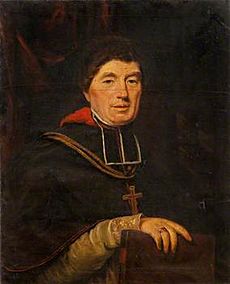Ranald MacDonald (bishop) facts for kids
Quick facts for kids The Right Reverend Ranald MacDonald |
|
|---|---|
| Vicar Apostolic of the Western District | |
 |
|
| Church | Roman Catholic Church |
| Appointed | 13 February 1827 |
| Reign ended | 20 September 1832 |
| Successor | Andrew Scott |
| Other posts | Titular Bishop of Arindela |
| Orders | |
| Ordination | 1782 |
| Consecration | 25 February 1820 by Alexander Paterson |
| Personal details | |
| Born | 1756 Edinburgh, Scotland |
| Died | 20 September 1832 (aged 76) Fort William, Scotland |
| Buried | Fort William, Scotland |
| Nationality | Scottish |
| Denomination | Roman Catholic |
| Parents | Ranald MacDonald and Margaret (née MacDonald) MacDonald |
| Previous post | Vicar Apostolic of the Highland District |
| Alma mater | Scots College, Douay |
Ranald MacDonald (1756–1832) was an important Roman Catholic bishop in Scotland. He led the church in the Scottish Highlands from 1819 to 1827. Later, he became the leader of the church in the Western part of Scotland from 1827 until 1832.
Contents
Early Life and Education
Ranald MacDonald was born in Edinburgh, Scotland, in 1756. He was the oldest child in his family. His father, also named Ranald MacDonald, was from an important family called Clan MacDonald of Keppoch.
Ranald went to school at the Scots College in Douay, France. This college helped train young Scottish men to become priests.
Becoming a Priest
After his studies, Ranald MacDonald became a priest in 1782. He returned to Scotland that same year. He worked in different places, including Glengairn and Glengarry, before moving to Uist.
Becoming a Bishop
In 1819, a special church authority called the Holy See chose Ranald MacDonald to be a bishop. He was named the Vicar Apostolic of the Highland District. A Vicar Apostolic is like a bishop who leads a specific church area that is not yet a full diocese. He was also given the title of Arindela. This is a special title for bishops who don't have a specific area to lead.
His main home as bishop was in Lismore. On February 25, 1820, he was officially made a bishop in Edinburgh. This ceremony is called a consecration, and it was led by Bishop Alexander Paterson.
Changes in Church Leadership
In 1827, the Roman Catholic Church in Scotland made some big changes. They reorganized the country into three main church areas, called vicariate apostolics. These were:
- The Eastern District
- The Northern District
- The Western District
The Western District was a new area created from parts of the other two. Because of these changes, Bishop MacDonald became the Vicar Apostolic of the new Western District on February 13, 1827.
Bishop MacDonald's Legacy
Bishop MacDonald was known for being very smart and well-educated. He was also a kind and polite person. People from all backgrounds liked him.
He worked hard to help people understand each other better. He was always ready to support ideas that would help the people of the Scottish Highlands.
He passed away while still serving as bishop on September 20, 1832. He was 76 years old and died in Fort William, where he was also buried.
The Iona Chalice
During his time as bishop, Ranald MacDonald received a very special item. It was one of Scotland's most important church treasures: the Last Chalice of Iona.
This chalice was made of fine gold. You could still see the marks from the hammer that shaped it, showing how old it was. It had been passed down through important families. A man named Colonel Ranaldson Macdonell of Glengarry gave it to Bishop Ranald MacDonald. After Bishop MacDonald died, the chalice was given to his successor, Bishop Scott.
 | Delilah Pierce |
 | Gordon Parks |
 | Augusta Savage |
 | Charles Ethan Porter |

